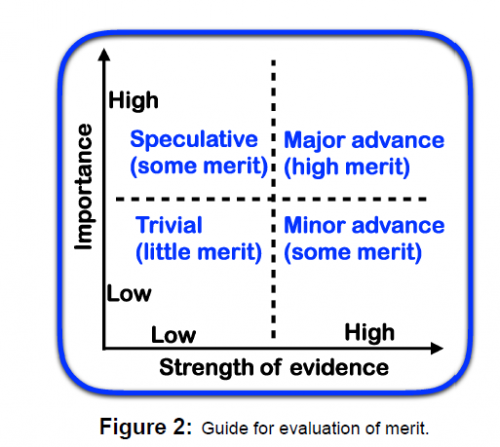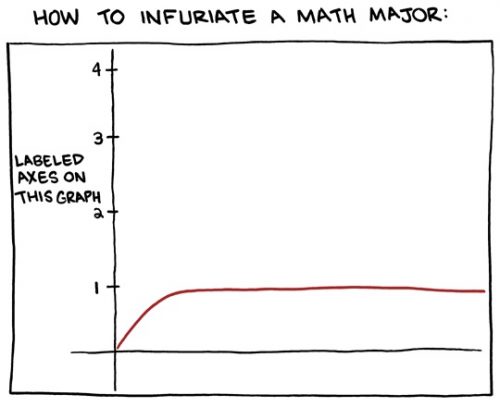I put a fairly substantial effort in critiquing that awful paper by Krylov and Co, and now my efforts are rewarded with a rebuttal by Lee Jussim. Oh no. I tremble in fear. But I will bravely acknowledge that his criticisms.
Ole PZ makes a zillion different points, nearly all wrong regarding our paper, but here I’ll just focus on one as illustration. He claims:
The first big problem, and one that plagues the whole paper, is that merit isn’t actually defined.
Ole PZ
is a bit familiar for someone I don’t know, but I’ll overlook it. As he says, I made a zillion different points,
so I have to congratulate him on wisely focusing on just one. It must be one that I really got embarrassingly wrong, so no doubt his refutation will be devastating.
He has chosen my claim that there is no definition of merit anywhere in their paper, so I anticipate that he will now quote the section of the paper that clearly defines merit, leaving me crushed and humiliated. I read on, dreading my imminent disgrace, and here it is, the part where he exposes me as someone who wasn’t able to understand their paper. This is where he defines “merit” for us all:
This is Figure 2 from the paper:
Of course, the “importance” of any given discovery, talk or paper may be pretty subjective until the fullness of time has weighed in. As our paper repeatedly acknowledged, scientists’ biases may creep in to influence judgments of merit. Nonetheless, we now know that discoveries that cigarettes cause cancer, that bacteria, not stress, cause ulcers and that genes influence many physical and psychological characteristics are pretty important, each of which was doubted, controversial or even dismissed at the time. It also took some time to discover that certain ideas lack merit (e.g., thalidomide is not safe to administer to women who are or might be pregnant; the implicit association test does not measure “unconscious racism”).
Uh, what?
I was expecting a howitzer shell to land on me and blow all my arguments away…but this is it? A graph with two quantitatively undefined axes, but merit
still isn’t defined at all. Instead, we’ve got two additional magic words, importance
and strength of evidence
, with no explanation of how they’re assessed. How do we determine what is important? That’s the whole question here, and he has just deferred the meaning of merit
to a different subjective term, importance,
modified by another fuzzy parameter, strength of evidence
.
OK, so where’s that definition of merit? This is the best he can do? I guess he instead decided to demonstrate the validity of my point, that merit isn’t actually defined. If it were, he would have trotted it out here.
Instead, we get a paragraph making excuses that merit may be pretty subjective
and isn’t always going to be obvious. Great! So my comments must have been pretty accurate.
I’m relieved to have emerged unscathed from that rebuttal, but also disappointed. Why are my opponents always so pathetic? I set myself up with a strong claim, that Jussim noticed, and he wasn’t even able to muster a single logical point against it. Pathetic.
I really didn’t have to type all those words. Apparently I should just reply with a bad graph.




Isn’t that “Fig.2” cribbed from “Dead Poets Society” ?
Maybe merit is akin to porn in that one knows it when they see it. And when allegedly in its purported presence it causes some to fondly circle jerk.
I did not sleep last night, is that why I don’t get his point? Yes, that must be it.
Merriam-Webster‘s 1c definition of merit is very interesting in this context:
with two examples given, the second one being pretty on point:
I would assume judging one’s future potential involves barriers overcome in one’s past.
imback@4, interesting how, unlike Jussim, to define merit, you didn’t repeatedly use the undefined word to define it.
But, hilariously, “Instead, we get a paragraph making excuses that merit “may be pretty subjective” and isn’t always going to be obvious.” is a backhanded concession of the entire damned point.
And especially jarring for me, the sentence “Nonetheless, we now know that discoveries that cigarettes cause cancer…”, um, what language is that in, because it isn’t any variant of proper English, which implies he releases scholarly work, specifically a disagreement to a critique of a prior scholarly work, without bothering to even proofread it.
Something that’s extremely rare in anything submitted for all to view by Ole PZ.
I’m pretty sure he’d have scored far more points toward the positive if he had simply called PZ a caca poo-poo poopyhead. Or devastate one and all by actually defining merit. And perhaps, just perhaps, not use an invalid argument in support of one’s argument. Bacteria cause one form of ulcer, there are multiple types of ulcers, whose causes can range from vascular interruption through drug induced. Ulcers have killed, which entirely didn’t involve bacteria, but instead were due to swallowed magnets or batteries. Perhaps, a better example may have been chosen? Unless one’s goal is to scattergun examples, hoping none notice invalid examples.
Doctor Frankenstein, there seems to be a scalpel embedded in your thigh.
Journal of Controversial Ideas = Journal Willing to Take Us Seriously.
Which is particularly strange, considering that the only argument presented appears to say that it somehow is obvious. After all, we apparently somehow “…now know that [various discoveries] are pretty important.”
No establishment of criteria, nor attempt to to distinguish relative levels of importance. We just… know, I guess.
Even when mentioning that “certain ideas lack merit”, there’s no attempt to determine whether they lack merit due to being unimportant or having poor strength of evidence. So, starting from a poor attempt at a definition, the author then immediately discards it and proceeds with no further reference to the terms presented.
What’s the point of the graph (shoddy as it is) if you’re not even going to try to use it? At least in Dead Poets’ Society (I had exactly the same association, astringer), specific examples were given and plotted on the graph, to demonstrate the idea. This doesn’t even reach that level.
This is the third sentence of the abstract of the paper.
Like everything about this paper it is wrong.
They are claiming Social Justice advocates and progressives are attacking and destroying science.
The real, relentless, and serious attacks on science are all coming from the fundie xians/right wingnuts. A few examples we see every day prove it.
.1. Climate change denial.
Since big money is involved this is ubiquitous.
Climate scientists get death threats often.
In the meantime, climate change has reached the point where we all see it and have to deal with the effects right now.
.2. Covid-19 virus denialism and Covid-19 virus Antivaxxers.
We’ve heard it often, the Covid-19 virus doesnt exist, it doesn’t kill, you can treat
it with Hydroxychloroquine, Ivermectin, or other quack remedies, and everyone who got vaccinated will drop dead in two years.
This ended up killing at least 330,000 US people.
.3. Evolution.
Whole anti-evolution monuments to ignorance exist such as the Creation museum and Ark park in Kentucky.
The creationists have been trying to prohibit evolution from being taught in schools for many decades with some success.
.4. Trans people don’t exist.
And after the right wingnuts finish outlawing and persecuting them, they won’t exist unless other people stop them.
There are serious and continuous attacks on science in the USA.
The authors of the Krylov paper just ignored them, who they are, and why they are attacking science.
So…basically in one sentence this guy concedes your point he’s claiming to refute, while leaving all “zillions” of your other points undisputed. Lamest joke ever. It’s almost like a comedian realizing, in mid-punchline, that he’d got his entire joke completely wrong.
“Not a number” becomes “not even a chart”
This is philosophy of science 101 stuff: if you’re going to claim to measure something, what are your units and how do you define it and measure it? “Merit” sounds like “goodness” but maybe there is some other criterion hidden in here…?
Lord Kelvin (“to measure is to know”) is spinning in his grave like a renewable power source.
“Not a number” becomes “not even a chart”
This is philosophy of science 101 stuff: if you’re going to claim to measure something, what are your units and how do you define it and measure it? “Merit” sounds like “goodness” but maybe there is some other criterion hidden in here…?
Lord Kelvin (“to measure is to know”) is spinning in his grave like a renewable power source.
Sorry, I don’t know how that happened. Button-mashing for emphasis?
Maybe my comment had Merit?
Whatever his sins, “Ole PZ” is a gift to us all.
“But the fact that some geniuses were laughed at does not imply that all who are laughed at are geniuses. They laughed at Columbus, they laughed at Fulton, they laughed at the Wright brothers. But they also laughed at Bozo the Clown.”
― Carl Sagan, Broca’s Brain: Reflections on the Romance of Science
Pretty much all that needs to be said in relation to the “updated definition” and sundry future predictions of genius (based on old wine in old bottles of old racism).
Louis
I’m in my MLIS program, and right now my class is hammering “define your terms”. It makes the point, over and over ad nauseum, that in social sciences it is more important than the physical sciences to define what your conception’s are and what you are actually measuring, not less.
I would get a failing paper if I used the word “merit” and then failed to describe how I defined and what I looked at to determine merit. Like, straight F, did not define parameters, do not pass go fail.